|
|
|
Sort Order |
|
|
|
Items / Page
|
|
|
|
|
|
|
| Srl | Item |
| 1 |
ID:
111248
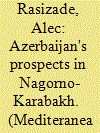

|
|
|
|
|
| Publication |
2011.
|
| Summary/Abstract |
Modern Azerbaijan is a typical Middle Eastern petrostate ruled by a classical Middle Eastern despot, where political (and economic) power is concentrated and inherited within the ruling family. Azerbaijan's military compact with Turkey, signed in 2010, suggests that Baku is preparing for war to take back Nagorno-Karabakh. Due to Azerbaijan's impending economic and strategic insignificance to the West after the peak of oil production in 2010, Azerbaijan needs to become more realistic in its claim to Nagorno-Karabakh, as its ability to persuade the great powers is set to dwindle synchronously with the depletion of oil reserves from 2011 to 2019.
|
|
|
|
|
|
|
|
|
|
|
|
|
|
|
|
| 2 |
ID:
118744
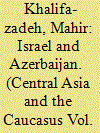

|
|
|
|
|
| Publication |
2012.
|
| Summary/Abstract |
It is well known that Azerbaijan's history does not have any anti-Semitic traditions. And during the time of the Russian and Soviet empires, Azerbaijan was not poisoned by anti-Semitism. Obviously, anti-Semitism has not been an issue in Azerbaijan. Moreover, many famous Jews were born and studied in Azerbaijan. The brilliant scientist of modern physics and Nobel Prize Laureate Lev Landau was born in Baku, Azerbaijan, in 1908 and attended Baku State University in 1922.
After the disintegration of the Soviet Union, the historically close and warm relations between the Jews and Azeris became a solid base for mutual cooperation between the State of Israel and the Republic of Azerbaijan. Both countries have a strategic location but an unfriendly foreign environment, which pushes them to be close and expand cooperation. Azerbaijan and Israel cooperate to counteract or neutralize foreign threats, which is the subject of this paper.
|
|
|
|
|
|
|
|
|
|
|
|
|
|
|
|
| 3 |
ID:
186548
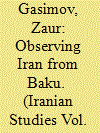

|
|
|
|
|
| Summary/Abstract |
Azerbaijani national identity emerged in post-Persian Russian-ruled East Caucasia at the end of the nineteenth century, and was finally forged during the early Soviet period. After the fiasco of the short-lived independence period of 1918–20, Azerbaijan became Soviet. Soviet power then instrumentalized Azerbaijan for political and ideological penetration into Iran by galvanizing local separatist movements. Azerbaijani Iranology was shaped within Soviet oriental studies and put into service of Azerbaijani nation-building. Exiled Iranian communists found asylum in Baku, joined local research institutions, wrote the first Persian academic and school textbooks, and contributed to the translation of classic Persian poetry into Azerbaijani. Soviet Azerbaijani Iranologists were sent as translators to the Soviet missions to Iran and Afghanistan. After Azerbaijan regained independence in 1991, its Iranological infrastructure was represented by several departments at the National Academy of Sciences and the Iranian Studies Program at Baku State University. While the number of Persian classes at schools during the last three decades diminished, a new generation of post-Soviet Iranologists—those who studied in Iran—emerged. While Soviet Azerbaijani Iranologists never created a solid bilingual dictionary of Persian, several Persian–Azerbaijani and Azerbaijani–Persian dictionaries were published in the 2010s. Post-Soviet Azerbaijani Iranology is still trying to find its place within humanities in the transitional nation.
|
|
|
|
|
|
|
|
|
|
|
|
|
|
|
|
| 4 |
ID:
114158
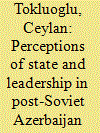

|
|
|
|
|
| Publication |
2012.
|
| Summary/Abstract |
The focus of this paper is the shifting perceptions of the state, leadership and politics, and the shifting perceptions of Azerbaijanis themselves and the outside world. The information presented in this article is based on personal interviews conducted with leading and influential members of the Azerbaijani political elite in Baku in August 1998 and April 2009. Attitudes and norms concerning the state, leadership and politics emanate from three sources: the legacy of the pre-Soviet (Turkish) period, the Soviet period, and the circulation of western democratic values and norms. This reflects the impact of historical and cultural forces that have shaped the lives of the political elites and are manifested in their understanding of contemporary governance. A powerful state and a strong leader mutually reinforce each other where the leader is perceived as responsible for the well-being of its citizens. In this context, the article examines the conflicting narratives of the government and the opposition in Azerbaijan while reconstructing their national past and building their future, where their past becomes an important source for the mentality of governance in the country.
|
|
|
|
|
|
|
|
|
|
|
|
|
|
|
|
| 5 |
ID:
128031
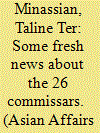

|
|
|
|
|
| Publication |
2014.
|
| Summary/Abstract |
One of the great founding legends of Soviet Union is that of the murder in September 1918 of 26 Soviet Commissars in Transcaspia, allegedly by a British officer, Reginald Teague-Jones. The episode which became the legend took place at the end of the First World War, at the very end of the eastern front, where the Russian withdrawal from the war left a vacuum and a situation which was confused, to say the least. Independent Soviets were springing up and one of these was the short-lived Baku Commune (also mythologised by the Soviets) When the Commune collapsed its leaders, the 26 Commissars, were imprisoned. Weeks later, in the confusion of the capture of Baku by the Turks, the Commissars escaped by boat, bound for Astrakhan, then held by the Bolsheviks. But they ended up in Krasnovodsk, in the hands of the anti-Bolsheviks and they were subsequently executed. Limited British forces (Malmiss and Dunforce) were in the area. They were initially deployed against the Turks, who were fighting on the German side, but then the Bolsheviks became the primary concern for the British. It is clear that Teague-Jones had a liaison role with the anti-Bolsheviks, but modern evidence suggests that it is very unlikely that he was even present at the execution of the 26 Commissars. The article shows how the legend grew and why the involvement of an agent of British Imperialism fitted a propaganda need.
|
|
|
|
|
|
|
|
|
|
|
|
|
|
|
|
|
|
|
|
|